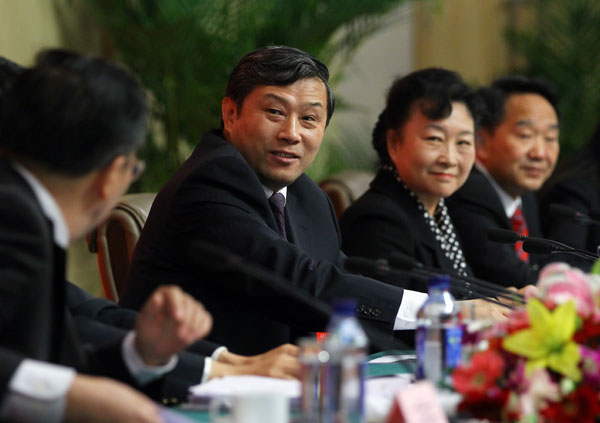No plot against foreign movies: official
 0 Comment(s)
0 Comment(s) Print
Print E-mail China Daily, November 12, 2012
E-mail China Daily, November 12, 2012
 |
|
Sun Zhijun, deputy head of the Publicity Department of the Communist Party of China Central Committee (center); Zhao Shaohua, vice-minister of culture (second right); and Jiang Jianguo, vice-minister of the General Administration of Press and Publication (right), attend a news conference on Sunday. ZOU HONG / CHINA DAILY |
Allegations that foreign films were not shown during certain periods, especially near the end of the year, were refuted by an official during a news conference that also heard China faced a "cultural deficit".
"There is no such thing as a domestic film protection month," said Tian Jin, deputy director of the State Administration of Radio, Film and Television at a news conference on Sunday on the sidelines of the 18th Party Congress.
The screening schedule is purely market driven, and the government does not dictate the release date for films, Tian said.
"Some periods see more domestic films being screened, some periods see more foreign films being released. That is a normal phenomenon."
He talked specifically about the closing months of the year, when dozens of top Chinese films are shown in cinemas. Foreign films usually shun these months, he said.
"This is due to business considerations," he said.
China overtook Japan in the first quarter this year to become the second-largest film market, in terms of box office, after the United States, according to the Motion Picture Association of America.
In the first 10 months, domestic box office receipts reached 13.27 billion yuan ($2.11 billion), an increase of 40 percent from the same period last year, Tian said.
However, only 41.4 percent of that came from domestic films, marking an end to their dominance of the domestic market. "Imported films have had a huge impact on the market," Tian said.
China and the US signed an agreement in February to give greater access to Hollywood films, which, according to Tian, is a testament to the fact that China is open to foreign productions.
The increase of imported films is part of what Zhao Shaohua, vice-minister of culture, called a "cultural deficit" facing the country.
 |
|
The screening schedule of films in Chinese cinemas is decided by the market, not by the countries they are from, an official said on Sunday. LIU JUNFENG / FOR CHINA DAILY |
Zhao said China needs to do more to acquaint the outside world with its 5,000-year-old culture.
China has signed cultural agreements with 149 countries and regions, facilitating exchange activities, Zhao said.
She called on private organizations to play a bigger role to increase global cultural diversity.
Sun Zhijun, deputy head of the Publicity Department of the CPC Central Committee, said that the aim of the country's cultural outreach is to enable other countries to know more about China.
He described the work of the Confucius Institutes, language centers established across the world in cooperation with local institutions, as an important platform for the world to get to know China.
China has established 398 institutes and 526 classrooms in 108 countries and regions since 2004.
The government is planning to increase the number of institutes to 1,000 by 2020. As many as 3,000 scholarships will be given to foreign students to study Chinese by 2013.







Go to Forum >>0 Comment(s)